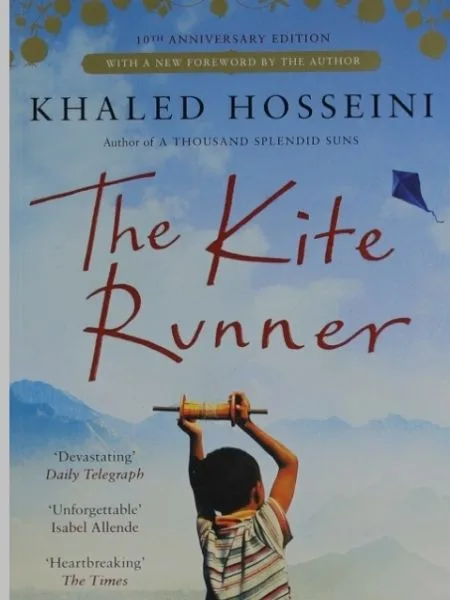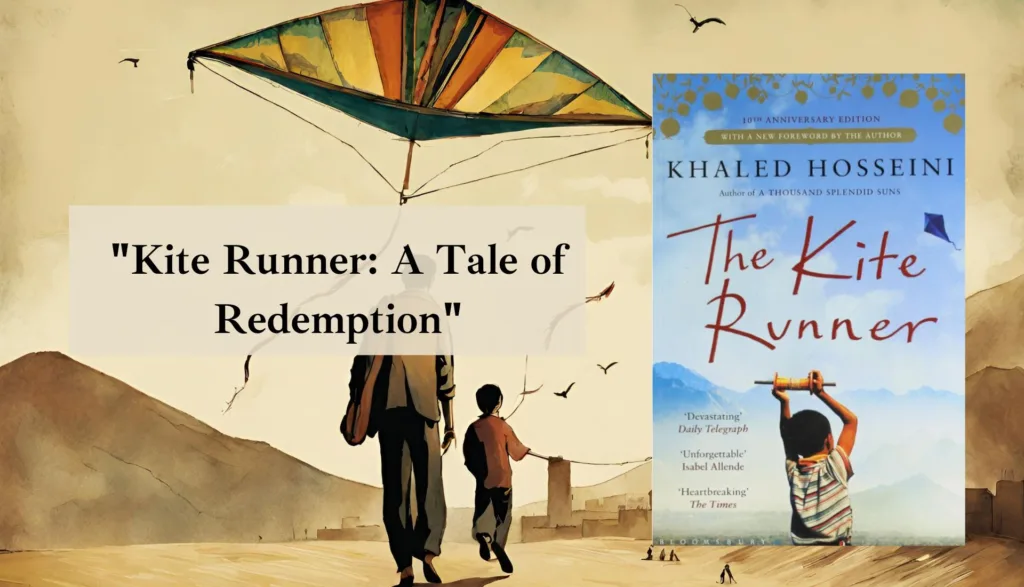Khaled Hosseini’s “The Kite Runner” is a poignant exploration of friendship, betrayal, and redemption against the backdrop of a turbulent Afghanistan. First published in 2003, this debut novel weaves a narrative tapestry that transcends borders and cultures, inviting readers into the lives of its characters. Set against the shifting socio-political landscape of Afghanistan, the novel delves into the complexities of human relationships and the haunting echoes of personal choices.
Khaled Hosseini:
Before immersing ourselves in “The Kite Runner,” it is crucial to understand the author, Khaled Hosseini. Born in Kabul in 1965, Hosseini later sought refuge in the United States following the Soviet invasion of Afghanistan. A practicing physician turned novelist, Hosseini’s personal connection to the cultural and historical intricacies of Afghanistan serves as a profound undercurrent in his works. His subsequent novels, including “A Thousand Splendid Suns” and “And the Mountains Echoed,” have further solidified his place as a literary force.

"The Kite Runner" Story Goes On:
“The Kite Runner” by Khaled Hosseini is a powerful and emotionally charged novel that delves into the complexities of friendship, betrayal, redemption, and the impact of historical events on personal lives. The story is narrated by Amir, a young boy from Kabul, Afghanistan, whose closest friend is Hassan, the son of his father’s servant.
The narrative unfolds against the backdrop of the changing political landscape in Afghanistan, spanning from the monarchy’s collapse to the rise of the Taliban. A pivotal event, a kite-fighting tournament, shapes the course of Amir and Hassan’s lives, leading to a traumatic incident that haunts Amir into adulthood.
The novel explores Amir’s journey to come to terms with his past and find redemption for the betrayals he committed against Hassan. As Amir grapples with guilt and shame, he embarks on a quest to make amends, and in doing so, he confronts the harsh realities of his homeland.
Hosseini’s storytelling is evocative, drawing readers into a world of vivid imagery and emotional turmoil. The characters are deeply human, flawed yet sympathetic, making the novel a poignant exploration of the complexities of human relationships and the enduring impact of choices.
“The Kite Runner” is not only a personal tale of one man’s quest for redemption but also a broader narrative that provides insight into the cultural and political upheavals in Afghanistan. With its universal themes and emotionally resonant storytelling, the novel has garnered widespread acclaim and has become a modern classic in contemporary literature.
Characters:
Amir: The novel’s narrator, Amir, undergoes a profound transformation from a conflicted and guilt-ridden boy to a man seeking redemption. His character serves as a lens through which readers witness the complexities of privilege, friendship, and personal responsibility.
Hassan: Hassan, the loyal friend and servant’s son, embodies unwavering loyalty and resilience. His character is a poignant representation of the injustices perpetuated by societal hierarchies and the enduring strength found in the face of adversity.
Baba: Amir’s father, Baba, is a complex figure whose actions and values shape Amir’s worldview. His character reflects the challenges of reconciling personal ideals with the harsh realities of a changing world.
Author Writing Style:
Khaled Hosseini’s writing style in “The Kite Runner” is marked by its lyrical prose and emotional depth. His vivid descriptions transport readers to the bustling streets of Kabul, creating a sensory experience that immerses them in the novel’s rich tapestry. Hosseini’s narrative unfolds with a delicate balance of suspense and introspection, allowing readers to connect intimately with the characters’ struggles and triumphs.
Critical Acclaim and Reader Response:
Critical acclaim for “The Kite Runner” has been resounding, with praise directed at Hosseini’s ability to capture the complexities of Afghan society, the authenticity of the characters, and the novel’s emotional impact. The novel’s exploration of universal themes such as guilt, redemption, and the enduring consequences of personal choices has resonated with both literary critics and readers alike.
The reader response to “The Kite Runner” has been passionate and deeply emotional. The novel’s ability to evoke empathy, prompt introspection, and foster a profound connection to its characters has resulted in a dedicated global following. Discussions often centre around the novel’s exploration of cultural identity, the impact of trauma, and the enduring power of redemption.
Adoption:
“The Kite Runner” has found widespread adoption in educational curricula, book clubs, and community reading programs. Its exploration of cultural nuances, coupled with its universal themes, makes it a versatile and thought-provoking addition to various literary discussions. The novel’s adaptation into a successful film further expanded its reach, introducing Hosseini’s narrative to audiences beyond the realm of literature.
Takeaway:
Redemption and Forgiveness: “The Kite Runner” serves as a powerful exploration of the themes of redemption and forgiveness. Amir’s journey becomes a universal tale of the human capacity for growth and healing in the face of past mistakes.
Cultural Reflections: Hosseini’s portrayal of Afghanistan provides readers with a nuanced understanding of its cultural heritage, allowing for reflections on the impact of political upheavals on individual lives and societal structures.
Impact of Personal Choices: The novel prompts readers to contemplate the far-reaching consequences of personal choices. It encourages introspection on themes of loyalty, guilt, and the complex interplay of societal expectations.
In “The Kite Runner,” Khaled Hosseini has crafted a literary masterpiece that transcends cultural boundaries, inviting readers into a world of complex emotions and profound human connections. The novel’s enduring appeal lies in its ability to navigate the intricate dance between personal choices and the pursuit of redemption. As readers soar through the skies with kites and grapple with the complexities of friendship and betrayal, “The Kite Runner” becomes a timeless testament to the transformative power of storytelling and its ability to bridge gaps between cultures and generations.

